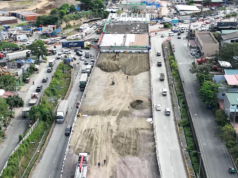CITY OF SAN FERNANDO – Enrolment in public elementary and high schools in Central Luzon is expected to decline this June as a result of the local impact of the global economic crisis and other factors, the director of the Department of Education in the region said in an interview on Monday.
Aside from parents losing their jobs or companies halting and cutting their employment hiring, the drop in enrolment can also be due to transfer of residence, sicknesses or early entry of high school students in the labor market, DepEd regional director Dr. Mario Ramirez said.
As of April 7, at least 66 companies had laid-off a total of 4,095 workers and put 9,254 others under flexible working arrangements like forced leaves and reduction in work hours, data from the regional Department of Labor and Employment showed.
The state provides free tuition and books in the public education in primary and secondary levels but the day-to-day expenses like travel fare, food allowance and school supplies put strains on the parents, he said.
Working to target a high enrolment rate, Ramirez said the DepEd has mobilized the 48,800 public school teachers in the region for a barangay-level campaign that encourages parents to put their children in school despite the hard times.
The campaign also urges the parents and students to avail of support from the Comprehensive Livelihood Emergency Employment Program initiated by President Macapagal-Arroyo among national agencies or local government units.
Information on education support programs like the home-based alternative learning system, accreditation and equivalency test, night schools or local community colleges are also shared to students so that they can resume or sustain their school as they work, he said.
While the total enrolment rates in the 2002-2008 period grew from 1.248 million to 1.306 million in the elementary and from 479,693 to 534,415 in high school, the increasing rates were not true for all seven provinces and 10 cities, according to DepEd data. Elementary enrolment fell in Bataan, Bulacan, Nueva Ecija, Pampanga and Tarlac while the Aurora and Zambales registered modest increases.
All cities reported gains, the highest in San Jose del Monte in Bulacan and City of San Fernando in Pampanga.
More students entered high schools in Aurora, Pampanga and Zambales. The rise was true for all cities except in Balanga City in Bataan and Gapan City in Nueva Ecija where there were slight decreases.
Drop-out rates in elementary went on a down-rise pattern, ending from an average of 0.68-percent in 2002 to 0.71 percent in 2007.
In high school, fewer students had dropped out of school for the same period.
Ramirez said that as parents try to cope with the impact of the crisis, the DepEd in the region would continue upgrading its teaching force and facilities to deliver quality education.
For school year 2009-2010, the regional agency needs to hire 460 elementary teachers and 1,115 high school teachers.
More rooms need to be built, at 1,258 in the elementary and 2,914 in high school. As for seats, the requests stand at 124,162 in the elementary and 106,474 in high school.
The DepEd central office has released 189 teaching items in the elementary and 229 in high school. Congressional offices are supporting 404 more items, Ramirez said.
Aside from parents losing their jobs or companies halting and cutting their employment hiring, the drop in enrolment can also be due to transfer of residence, sicknesses or early entry of high school students in the labor market, DepEd regional director Dr. Mario Ramirez said.
As of April 7, at least 66 companies had laid-off a total of 4,095 workers and put 9,254 others under flexible working arrangements like forced leaves and reduction in work hours, data from the regional Department of Labor and Employment showed.
The state provides free tuition and books in the public education in primary and secondary levels but the day-to-day expenses like travel fare, food allowance and school supplies put strains on the parents, he said.
Working to target a high enrolment rate, Ramirez said the DepEd has mobilized the 48,800 public school teachers in the region for a barangay-level campaign that encourages parents to put their children in school despite the hard times.
The campaign also urges the parents and students to avail of support from the Comprehensive Livelihood Emergency Employment Program initiated by President Macapagal-Arroyo among national agencies or local government units.
Information on education support programs like the home-based alternative learning system, accreditation and equivalency test, night schools or local community colleges are also shared to students so that they can resume or sustain their school as they work, he said.
While the total enrolment rates in the 2002-2008 period grew from 1.248 million to 1.306 million in the elementary and from 479,693 to 534,415 in high school, the increasing rates were not true for all seven provinces and 10 cities, according to DepEd data. Elementary enrolment fell in Bataan, Bulacan, Nueva Ecija, Pampanga and Tarlac while the Aurora and Zambales registered modest increases.
All cities reported gains, the highest in San Jose del Monte in Bulacan and City of San Fernando in Pampanga.
More students entered high schools in Aurora, Pampanga and Zambales. The rise was true for all cities except in Balanga City in Bataan and Gapan City in Nueva Ecija where there were slight decreases.
Drop-out rates in elementary went on a down-rise pattern, ending from an average of 0.68-percent in 2002 to 0.71 percent in 2007.
In high school, fewer students had dropped out of school for the same period.
Ramirez said that as parents try to cope with the impact of the crisis, the DepEd in the region would continue upgrading its teaching force and facilities to deliver quality education.
For school year 2009-2010, the regional agency needs to hire 460 elementary teachers and 1,115 high school teachers.
More rooms need to be built, at 1,258 in the elementary and 2,914 in high school. As for seats, the requests stand at 124,162 in the elementary and 106,474 in high school.
The DepEd central office has released 189 teaching items in the elementary and 229 in high school. Congressional offices are supporting 404 more items, Ramirez said.




